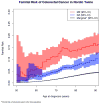Familial Risk and Heritability of Colorectal Cancer in the Nordic Twin Study of Cancer
- PMID: 28130150
- PMCID: PMC5522647
- DOI: 10.1016/j.cgh.2016.12.041
Familial Risk and Heritability of Colorectal Cancer in the Nordic Twin Study of Cancer
Abstract
Background & aims: We analyzed data from twins to determine how much the familial risk of colorectal cancer can be attributed to genetic factors vs environment. We also examined whether heritability is distinct for colon vs rectal cancer, given evidence of distinct etiologies.
Methods: Our data set included 39,990 monozygotic and 61,443 same-sex dizygotic twins from the Nordic Twin Study of Cancer. We compared each cancer's risk in twins of affected co-twins relative to the cohort risk (familial risk ratio [FRR]). We then estimated the proportion of variation in risk that could be attributed to genetic factors (heritability).
Results: From earliest registration in 1943 through 2010, there were 1861 individuals diagnosed with colon cancer and 1268 diagnosed with rectal cancer. Monozygotic twins of affected co-twins had an FRR for colorectal cancer of 3.1 (95% confidence interval [CI], 2.4-3.8) relative to the cohort risk. Dizygotic twins of affected co-twins had an FRR for colorectal cancer of 2.2 (95% CI, 1.7-2.7). We estimated that 40% (95% CI, 33%-48%) of the variation in colorectal cancer risk could be attributed to genetic factors; unique environment only accounted for the remaining liability. For colon cancer, the FRR was 3.3 (95% CI, 2.1-4.5) for monozygotic twins and 2.6 (95% CI, 1.7-3.5) for dizygotic twins. For rectal cancer, comparable estimates were 3.3 (95% CI, 1.5-5.1) for monozygotic twins and 2.6 (95% CI, 1.2-4.0) for dizygotic twins. Heritability estimates for colon and rectal cancer were 16% (95% CI, 0-46%) and 15% (95% CI, 0-50%), common environment estimates were 15% (95% CI, 0-38%) and 11% (95% CI, 0-38%), and unique environment estimates were 68% (95% CI, 57%-79%) and 75% (95% CI, 61%-88%), respectively.
Conclusions: Interindividual genetic differences could account for 40% of the variation in susceptibility to colorectal cancer; risk for colon and rectal cancers might have less of a genetic component than risk for colorectal cancer. Siblings, and particularly monozygotic co-twins, of individuals with colon or rectal cancer should consider personalized screening.
Keywords: Biometric Modeling; Concordance Relative Risk; Genetic Susceptibility; Zygosity.
Copyright © 2017 AGA Institute. Published by Elsevier Inc. All rights reserved.
Figures




Comment in
-
The Impact of Family History on the Risk of Colorectal Neoplasia and Screening Practices.Clin Gastroenterol Hepatol. 2017 Aug;15(8):1204-1206. doi: 10.1016/j.cgh.2017.04.022. Epub 2017 Apr 19. Clin Gastroenterol Hepatol. 2017. PMID: 28433780 No abstract available.
-
Risk of Colorectal Carcinoma in Siblings of Probands With Common Colorectal Carcinoma.Clin Gastroenterol Hepatol. 2018 Feb;16(2):298. doi: 10.1016/j.cgh.2017.08.048. Epub 2017 Sep 1. Clin Gastroenterol Hepatol. 2018. PMID: 28870661 No abstract available.
-
Reply.Clin Gastroenterol Hepatol. 2018 Feb;16(2):298-299. doi: 10.1016/j.cgh.2017.09.018. Clin Gastroenterol Hepatol. 2018. PMID: 29389490 No abstract available.
References
MeSH terms
Grants and funding
LinkOut - more resources
Full Text Sources
Other Literature Sources

